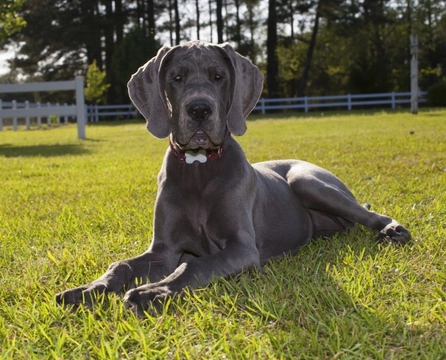
How to decide upon a puppy food for large and giant breeds of dog
When you first collect your new puppy from their breeder, rehoming shelter or other seller, you should find out what they have been fed up until now and stick with this for a little while, until your puppy gets settled in. However, you will also need to make a decision as to what you wish to feed your pup for the rest of their younger years, and this means taking into account a wide range of factors including the breed of your dog, their growth rate, their likely eventual size, and various other things too.
Large and giant breeds of dog need a significant level of nutritional support in order to support their growth, which is often slower than that of smaller breeds, and in some cases, giant breeds of dog continue to grow up until around the age of two years old. There are several pet food ranges that offer a puppy food specifically designed for large and giant breeds, but how can you be sure that you make the right decision on what is likely to be best buy for your own dog?
Read on to find out more about how to decide upon a puppy food for your large or giant breed pup.
How often should puppies be fed?
Your pup should be fed little and often, and three meals a day is the ideal up until the pup is around 16 weeks old, after which point you can decide whether to keep feeding them three times a day, or drop down to twice.
It is important to get your pup into a feeding routine while they are still young, feeding them at around the same times each day, and ensuring that their feeding regime is consistent and predictable.
How does food for larger breeds differ to small dog food?
Different types of puppy food are designed to meet the needs of different types of puppies, and you should look for a brand that provides a diet tailored to puppies that are on the large size!
The bigger the dog, the slower their metabolism will be, and the same is true of their growth rate, meaning that they will need a different combination of ingredients than smaller pups that do everything faster!
Large breeds of dog don’t require as much calcium as smaller dogs during their younger years, as this can cause the pup’s growth to accelerate, leading to growing pains and potentially, damage to the joints and bones in large dogs. The food that you give to your larger breed pup should support healthy growth at the normal rate, which should be slow and steady.
A good balance of other ingredients such as protein, fibre, fats and carbs is important too, and this should be provided in all complete foods designed for larger breeds.
Essential elements of a large puppy’s diet
The food that you decide upon for your large or giant puppy should tick all of the boxes in terms of complete, high quality nutrition, providing all of the following ingredients:
- Fish oils for joint and bone growth.
- Essential vitamins.
- Digestive fibre.
- Appropriate levels of calcium and phosphorous to support skeletal growth.
- Minerals and oils to support the immune system.
- High quality protein to enhance the organs, skin and coat.
Feeding a larger puppy and getting things right is even more vital than it is for smaller dogs, due to the development speed and growth pattern of larger breeds, and this will generally mean that your dog food will be more expensive, not only because you will need more of it, but because you should select good quality brands that are designed especially for large breeds.
Checking the ingredients listing of the foods you are considering is essential, and you should try to steer clear of foods with high levels of salt, sugars or fillers such as corn, gluten, starch and rice.
Another point to note is that many large and giant breeds of dog are more prone to developing bloat or GDV than smaller breeds, due to the depth of their chests in relation to their size. While many factors can contribute to the development of GDV and in some cases the condition will arise with no triggering factors at all, it is wise to begin feeding your pup from the get-go in such a way as to avoid making some of the mistakes that can contribute to the condition’s development.
This means that you shouldn’t feed huge portions at one time or allow your dog to wolf down or gulp their food, and so you may need to look at ways of slowing them down, such as placing an obstacle in their bowls that they have to eat around. You should also of course ensure free access to clean water for your dog at all times, in order to keep them hydrated and allow them to get the best out of their food.



